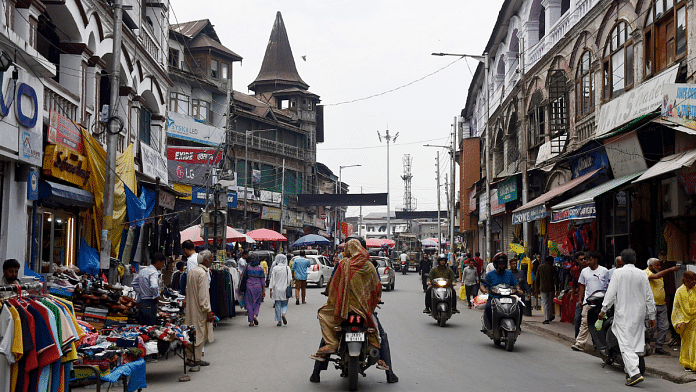New Delhi: In a fresh affidavit filed before the Supreme Court Monday evening, the Modi government has asserted that it has brought “unprecedented development, progress, security and stability” in Jammu & Kashmir following the abrogation of Article 370.
This comes a day before the top court’s constitution bench is scheduled to hear a batch of petitions that have challenged the revocation of Article 370 as well as notification of the J&K Reorganisation Act, which divided the erstwhile state into two Union territories. Chief Justice of India D.Y. Chandrachud heads the bench, which also includes justices S.K. Kaul, Sanjeev Khanna, B.R. Gavai and Surya Kant.
“It is submitted that after the said historic changes, the UTs of Jammu & Kashmir and Ladakh witnessed profound ameliorative, affirmative and progressive changes in the last four years encompassing its entire governance — including the developmental activities, public administration and security matters which has positively impacted every resident, irrespective of caste, creed and religion,” said the affidavit filed by Ministry of Home Affairs joint secretary Prashant S Lokhande.
To buttress its claim, the ministry gave figures to highlight a drop in terrorist recruitments as well as stone-throwing incidents and hartals (strikes), which, according to the affidavit, were organised by secessionist groups.
The affidavit further said that work on transit accommodation for Kashmiri Pandits for their safe return to the Valley is in the advanced stage and is expected to be majorly completed in the next one year.
The unprecedented development, a “testament of Parliamentary wisdom” has been “exercised prudently,” something which was missing during the old Article 370 regime, the affidavit claimed. These changes witnessed in the post-abrogation period have been described as “historic” in the government document.
Also Read: Abrogation of Article 370 ‘death of democracy as it was done without consent of state’: Digvijaya
‘No strikes or any kind of disturbances in 3 yrs’
According to the affidavit, the democratic constitutional step has changed the “entire spectrum of social and economic life of residents of the region”, irrespective of caste, creed and region. It talked about how life has returned to normalcy in the region after over three decades of turmoil and schools, colleges, universities, hospitals and other public institutions have been functioning efficiently ever since Article 370 was removed.
The document made claims of no “strikes” or “any kind of disturbances” during the last three years, with “daily hartals, strikes, stone pelting and bandhs” becoming issues of the past.
“Organised street violence” and “hartals orchestrated by terrorists” were the primary cause for unrest in the region, which no longer exists, the affidavit emphasised.
“The organised stone pelting incidences connected with terrorism-separatist agenda, which were as high as 1767 in the year 2018, has come down to zero in 2023 till date. In 2018, there were 52 incidents of organised bandh/hartal, which has come down to zero in the year 2023 till date,” claimed the affidavit.
“Resolute anti-terror actions” have “dismantled” the terror ecosystem, the affidavit said, adding that this is also reflected in a significant drop in terrorist recruitment — 12 in 2023 from 199 in 2018.
Stone-throwing incidents and hartals had tremendous “negative ripple effects on economy and society”, resulting in closure of educational institutions and impacting trade and industries there. This inflicted severe loss of income, especially upon the poor and those who worked in the unorganised sectors of the economy, it said.
‘Highest ever tourist footfall’
Given that the security scenario has improved in J&K, the UT has also witnessed the highest ever footfall of tourists. More than 1.88 crore tourists visited J&K between January and December 2022. This has significantly contributed to the growth of the economy and has had a direct impact on the income of the common man, said the affidavit.
During the first five months of 2023, around 80.4 lakh tourists visited J&K. This shows that tourism has emerged as a most vibrant sector, it added.
The affidavit underlined measures it has taken to “improve quality of life for people” in Jammu & Kashmir where, the central government said, it has adopted a “policy of zero tolerance against terrorism”.
Policies to mainstream the youth are being encouraged, employment opportunities are being worked out to wean them away from militancy, adequate opportunities to all sections of people in J&K are amongst the citizen-centric measures taken by the government in the region.
“It is submitted that a programme called ‘Apki Zameen Apki Nigrani’ was launched in which entire land record in the Union territory of J&K was computerised in a short span of less than a year and put into public domain enabling citizens to access the land records without any human interface,” the affidavit submitted.
Work on three hydro-electric projects has begun and are in full swing. All the projects are expected to be completed by 2025-26, the affidavit said, claiming the hydro-electric potential of the UT was highly underutilised.
In addition, Memorandum of Understandings (MoU) for four new projects worth Rs 29,600 crore have been signed, which will add to the power generation capacity of 3,284 MW in the Union territory, the affidavit said.
(Edited by Gitanjali Das)
Also Read: Article 370 to G20, India is in a Kashmir sweet spot. Now, tick the last boxes



